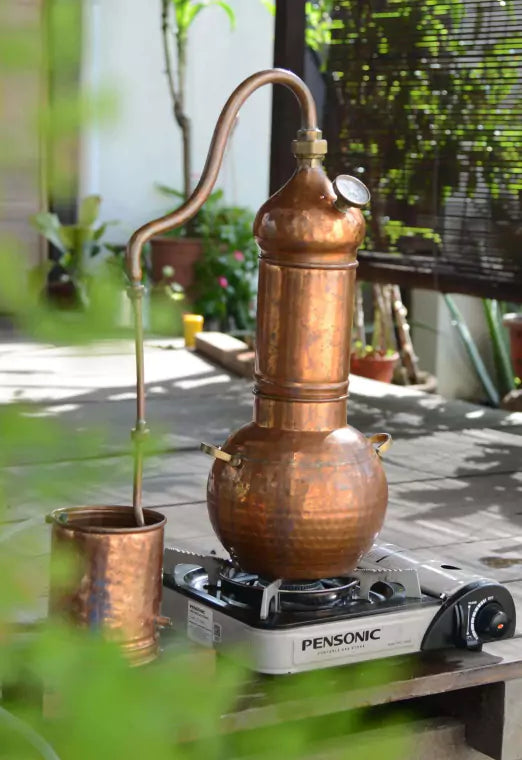About Us
What Are Hydrosols?
You've certainly heard the term "hydrosol" before, but what does it actually mean? A common name for hydrosols is "floral waters." This is because they are produced by distilling fresh plant materials like flowers, leaves, fruits, etc. They are aromatic waters that contain the water-soluble compounds, trace essential oil molecules, and other plant components that are present in the plant material being distilled.They are versatile and can be incorporated into daily routines for their mild fragrance and potential therapeutic benefits.
Extraction Process
How Are Hydrosols Extracted?
-
Plant material preparation
Based on the desired hydrosol, premium plant components are chosen, such as flowers, leaves, stems, or other botanical elements.The plant material is chopped or crushed to facilitate the release of aromatic compounds during distillation.
-
Steam Generation
The plant material is put into a specialised still, then the steam is produced in the boiler by adding water and applying heat. As it rises, the steam picks up volatile aromatic chemicals from the plant matter.
-
Steam Distillation
Essential oils and other aromatic compounds are extracted from the plant material when the rising steam passes through it.The steam carrying these compounds is then directed into a condensation apparatus.
-
Condensation
The steam is rapidly cooled in the condensation apparatus, which causes it to condense back into a liquid state.As the steam condenses, it separates into two phases: the essential oil, which floats on top, and the hydrosol, which is the water-soluble portion.
-
Collection & Seperation
The hydrosol is collected separately from the essential oil.
It is typically stored in dark, airtight containers to preserve its quality.

Our Benefits
Benefits And Uses Of Hydrosols
Easy to incorporate into a busy life, hydrosols can be used in a variety of ways! It is about time you try using hydrosols if you haven't before.Here are some tips on how to use hydrosols in your home on a regular basis to bring lovely floral scents inside.
Natural Perfume
Hydrosols often have a pleasant, delicate scent that can be used as a natural perfume or body spray.They provide a soft, enduring scent without the overwhelming fragrance of synthetic fragrances.
Yoga and Meditation
Use hydrosols during your yoga or meditation practice to enhance the sensory experience and promote relaxation.
Relaxation
Using hydrosols to mist the air or your pillow will help you relax and calm down. Some hydrosols, like lavender, are popular for their relaxing effects and are frequently used to encourage rest and sleep.
Hair care
To encourage healthy hair and scalp, hydrosols can be added to hair care products or used as hair sprays. They can aid with dandruff, dryness, and bad hair days.

What To Look For In A Hydrosol?
Verify that the product you're using is a legitimate hydrosol before using it. Frequently, businesses will sell products that have been perfumed with "fragrances," which are synthetic substances, instead of true hydrosols. To make sure you're obtaining the best hydrosol possible, Here are some key factors to look for when buying hydrosols:
-
Botanical Source:
Verify that the hydrosol is made from the particular plant or botanical you are looking for. There are numerous types of some plants, and the source may influence the hydrosol's characteristics. -
Quality & Purity:
Look for hydrosols that are labeled as 100% pure and free from additives, preservatives, or synthetic fragrances. -
Packaging:
Hydrosols should be packaged in dark or opaque glass bottles since they are sensitive to light. Make sure the container has an airtight seal to stop contamination and evaporation. -
Storage and Expiration Date:
Hydrosols have a longer shelf life than essential oils. On the packaging, look for a date of expiration. If they’re stored well, hydrosols can have a shelf life of 1 to 2 years. -
Price:
Although a determinant, pricing shouldn't be the only one used to make a decision. Pure hydrosols of superior quality may cost more money, but they are worthwhile due to their efficacy.
What iIs The Difference
Difference Between Hydrosol And Essential Oils
Even though hydrosols are completely natural and ideal for almost all skin types, someone with delicate skin should avoid putting them on cracked or inflamed, and itchy skin. Before applying an innovative product on your face, just like with all product lines, invariably undertake a skin test commonly referred to as a patch test

Essential Oils
On the other hand, essential oils are extracts that are obtained using the same distillation process but are much more concentrated. They are incredibly strong and contain the concentrated aromatic components of the plant. Without the right dilution, essential oils should never be applied directly to the skin since they may irritate or sensitise the skin. Their therapeutic benefits, such as those related to relaxation, mood enhancement, and physical wellness, are the main reasons why they are utilised in aromatherapy. Essential oils are often used in diffusers, massage oils, and topical blends, but they require careful handling due to their potency.

Hydrosol
Simply put, the hydrosol is a water-based product also known as aromatic water, while the essential oil is… well, oil!Hydrosols, also known as floral waters or plant waters, are the co-product of steam distillation or hydro-distillation used to extract essential oils from plants.They also contain other water-soluble elements and a diluted form of the plant's aromatic chemicals.They are mild and don't require much dilution when applied directly to the skin as compared to the essential oils. There are several uses for hydrosols, including in cosmetics, aromatherapy, etc. They are renowned for their moisturising and calming qualities.
Why Us ?
Featured collection
This means they’re gentler than essential oils and can be applied directly to your skin without needing to dilute them with a carrier oil. They also have a more subtle scent than their essential oil counterparts. Essential oils and hydrosols have some similar properties, but hydrosols have a much higher water content.





















